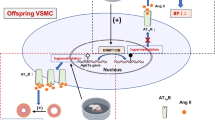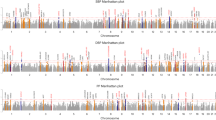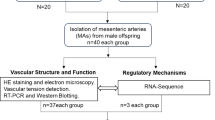Abstract
The multi-generation heredity trait of hypertension in human has been reported, but the molecular mechanisms underlying multi-generational inheritance of hypertension remain obscure. Recent evidence shows that prenatal inflammatory exposure (PIE) results in increased incidence of cardiovascular diseases, including hypertension. In this study we investigated whether and how PIE contributed to multi-generational inheritance of hypertension in rats. PIE was induced in pregnant rats by intraperitoneal injection of LPS or Poly (I:C) either once on gestational day 10.5 (transient stimulation, T) or three times on gestational day 8.5, 10.5, and 12.5 (persistent stimulation, P). Male offspring was chosen to study the paternal inheritance. We showed that PIE, irrespectively induced by LPS or Poly (I:C) stimulation during pregnancy, resulted in multi-generational inheritance of significantly increased blood pressure in rat descendants, and that prenatal LPS exposure led to vascular remodeling and vasoconstrictor dysfunction in both thoracic aorta and superior mesenteric artery of adult F2 offspring. Furthermore, we revealed that PIE resulted in global alteration of DNA methylome in thoracic aorta of F2 offspring. Specifically, PIE led to the DNA hypomethylation of G beta gamma (Gβγ) signaling genes in both the F1 sperm and the F2 thoracic aorta, and activation of PI3K/Akt signaling was implicated in the pathologic changes and dysregulated vascular tone of aortic tissue in F2 LPS-P offspring. Our data demonstrate that PIE reprogrammed DNA methylome of cells from the germline/mature gametes contributes to the development of hypertension in F2 PIE offspring. This study broadens the current knowledge regarding the multi-generation effect of the cumulative early life environmental factors on the development of hypertension.
Similar content being viewed by others
Log in or create a free account to read this content
Gain free access to this article, as well as selected content from this journal and more on nature.com
or
References
Coffman TM. Under pressure: the search for the essential mechanisms of hypertension. Nat Med. 2011;17:1402–9.
Niiranen TJ, McCabe EL, Larson MG, Henglin M, Lakdawala NK, Vasan RS, et al. Risk for hypertension crosses generations in the community: a multi-generational cohort study. Eur Heart J. 2017;38:2300–8.
Deng Y, Song L, Nie X, Shou W, Li X. Prenatal inflammation exposure-programmed cardiovascular diseases and potential prevention. Pharmacol Ther. 2018;190:159–72.
Estes ML, McAllister AK. Maternal immune activation: implications for neuropsychiatric disorders. Science. 2016;353:772–7.
Mazumder B, Almond D, Park K, Crimmins EM, Finch CE. Lingering prenatal effects of the 1918 influenza pandemic on cardiovascular disease. J Dev Orig Health Dis. 2010;1:26–34.
Cocoros NM, Lash TL, Ozonoff A, Norgaard M, DeMaria A Jr., Andreasen V, et al. Prenatal influenza exposure and cardiovascular events in adulthood. Influenza Other Respir Viruses. 2014;8:83–90.
Liguori A, D’Armiento FP, Palagiano A, Palinski W, Napoli C. Maternal C-reactive protein and developmental programming of atherosclerosis. Am J Obstet Gynecol. 2008;198:281 e1–5.
Tanacan A, Yazihan N, Erol SA, Anuk AT, Yucel Yetiskin FD, Biriken D, et al. The impact of COVID-19 infection on the cytokine profile of pregnant women: a prospective case-control study. Cytokine. 2021;140:155431.
Mendis S, Armstrong T, Bettcher D, Branca F, Lauer J, Mace C, et al. Global status report on noncommunicable diseases 2014. Report No: Stroke. 2014. https://www.who.int/publications/i/item/9789241564854.
Padmanabhan S, Joe B. Towards precision medicine for hypertension: a review of genomic, epigenomic, and microbiomic effects on blood pressure in experimental rat models and humans. Physiol Rev. 2017;97:1469–528.
Hao XQ, Zhang HG, Yuan ZB, Yang DL, Hao LY, Li XH. Prenatal exposure to lipopolysaccharide alters the intrarenal renin-angiotensin system and renal damage in offspring rats. Hypertens Res. 2010;33:76–82.
Wei YL, Li XH, Zhou JZ. Prenatal exposure to lipopolysaccharide results in increases in blood pressure and body weight in rats. Acta Pharmacol Sin. 2007;28:651–6.
Liao W, Wei Y, Yu C, Zhou J, Li S, Pang Y, et al. Prenatal exposure to zymosan results in hypertension in adult offspring rats. Clin Exp Pharmacol Physiol. 2008;35:1413–8.
Sales VM, Ferguson-Smith AC, Patti ME. Epigenetic mechanisms of transmission of metabolic disease across generations. Cell Metab. 2017;25:559–71.
Sharma U, Rando OJ. Metabolic inputs into the epigenome. Cell Metab. 2017;25:544–58.
Horvath S, Raj K. DNA methylation-based biomarkers and the epigenetic clock theory of ageing. Nat Rev Genet. 2018;19:371–84.
Martinez D, Pentinat T, Ribo S, Daviaud C, Bloks VW, Cebria J, et al. In utero undernutrition in male mice programs liver lipid metabolism in the second-generation offspring involving altered Lxra DNA methylation. Cell Metab. 2014;19:941–51.
Ferguson-Smith AC, Patti ME. You are what your dad ate. Cell Metab. 2011;13:115–7.
Deng Y, Deng Y, He X, Chu J, Zhou J, Zhang Q, et al. Prenatal inflammation-induced NF-kappaB dyshomeostasis contributes to renin-angiotensin system over-activity resulting in prenatally programmed hypertension in offspring. Sci Rep. 2016;6:21692.
Zhao S, Zhang H, Cao D, Liu Y, Li X. Lipopolysaccharide exposure during pregnancy leads to aortic dysfunction in offspring rats. PLoS One. 2014;9:e102273.
Loberg RD, Northcott CA, Watts SW, Brosius FC 3rd. PI3-kinase-induced hyperreactivity in DOCA-salt hypertension is independent of GSK-3 activity. Hypertension. 2003;41:898–902.
Kumaki Y, Oda M, Okano M. QUMA: quantification tool for methylation analysis. Nucleic Acids Res. 2008;36:W170–5.
Deng Y, Kerdiles Y, Chu J, Yuan S, Wang Y, Chen X, et al. Transcription factor foxo1 is a negative regulator of natural killer cell maturation and function. Immunity. 2015;42:457–70.
Arnett DK, Claas SA. Omics of blood pressure and hypertension. Circ Res. 2018;122:1409–19.
Kelsey G, Stegle O, Reik W. Single-cell epigenomics: recording the past and predicting the future. Science. 2017;358:69–75.
Patel RS, Masi S, Taddei S. Understanding the role of genetics in hypertension. Eur Heart J. 2017;38:2309–12.
Lacolley P, Regnault V, Segers P, Laurent S. Vascular smooth muscle cells and arterial stiffening: relevance in development, aging, and disease. Physiol Rev. 2017;97:1555–617.
Heusch G, Libby P, Gersh B, Yellon D, Bohm M, Lopaschuk G, et al. Cardiovascular remodelling in coronary artery disease and heart failure. Lancet. 2014;383:1933–43.
Kato N, Loh M, Takeuchi F, Verweij N, Wang X, Zhang W, et al. Trans-ancestry genome-wide association study identifies 12 genetic loci influencing blood pressure and implicates a role for DNA methylation. Nat Genet. 2015;47:1282–93.
Richard MA, Huan T, Ligthart S, Gondalia R, Jhun MA, Brody JA, et al. DNA methylation analysis identifies loci for blood pressure regulation. Am J Hum Genet. 2017;101:888–902.
Heard E, Martienssen RA. Transgenerational epigenetic inheritance: myths and mechanisms. Cell. 2014;157:95–109.
Hopkins PN. Molecular biology of atherosclerosis. Physiol Rev. 2013;93:1317–542.
Belmonte SL, Blaxall BC. G protein coupled receptor kinases as therapeutic targets in cardiovascular disease. Circ Res. 2011;109:309–19.
Brinks HL, Eckhart AD. Regulation of GPCR signaling in hypertension. Biochim Biophys Acta. 2010;1802:1268–75.
Lopez-Ilasaca M, Crespo P, Pellici PG, Gutkind JS, Wetzker R. Linkage of G protein-coupled receptors to the MAPK signaling pathway through PI 3-kinase gamma. Science. 1997;275:394–7.
Jo SH, Leblais V, Wang PH, Crow MT, Xiao RP. Phosphatidylinositol 3-kinase functionally compartmentalizes the concurrent G(s) signaling during beta2-adrenergic stimulation. Circ Res. 2002;91:46–53.
Sata M, Nagai R. Phosphatidylinositol 3-kinase: a key regulator of vascular tone? Circ Res. 2002;91:273–5.
Saxton RA, Sabatini DM. mTOR signaling in growth, metabolism, and disease. Cell. 2017;168:960–76.
Daxinger L, Whitelaw E. Understanding transgenerational epigenetic inheritance via the gametes in mammals. Nat Rev Genet. 2012;13:153–62.
Lane M, Robker RL, Robertson SA. Parenting from before conception. Science. 2014;345:756–60.
Park C, Kim TM, Malik AB. Transcriptional regulation of endothelial cell and vascular development. Circ Res. 2013;112:1380–400.
Bogdarina I, Welham S, King PJ, Burns SP, Clark AJ. Epigenetic modification of the renin-angiotensin system in the fetal programming of hypertension. Circ Res. 2007;100:520–6.
Northcott CA, Poy MN, Najjar SM, Watts SW. Phosphoinositide 3-kinase mediates enhanced spontaneous and agonist-induced contraction in aorta of deoxycorticosterone acetate-salt hypertensive rats. Circ Res. 2002;91:360–9.
Harlan SM, Rahmouni K. PI3K signaling: a key pathway in the control of sympathetic traffic and arterial pressure by leptin. Mol Metab. 2013;2:69–73.
Calay ES, Hotamisligil GS. Turning off the inflammatory, but not the metabolic, flames. Nat Med. 2013;19:265–7.
Acknowledgements
This study was supported by National Natural Science Foundation of China (81773742, 81520108029), National Key Research and Development Project (2019YFA0111200, 2020YFA0113500), and Chongqing Science and Technology Commission of China (cstc2017jcyjBX0058).
Author information
Authors and Affiliations
Contributions
XG, BBC, YCD, and XHL designed the project and analyzed the data. XG, WNS, and YCD wrote the manuscript. GRD, WJL, FJW, MM, BHM, YJ, PH, TTY, YFD, LS, and WG performed the animal experiments. YY performed the canonical pathways analyzing. XG and GRD performed the qRT-PCR assays and western blots. PY, JHY, YG, and WNS gave experiment suggestions or provided experiment materials for this research. All authors read and approved the final manuscript.
Corresponding authors
Ethics declarations
Competing interests
The authors declare no competing interests.
Supplementary information
Rights and permissions
About this article
Cite this article
Guan, X., Dan, Gr., Yang, Y. et al. Prenatal inflammation exposure-programmed hypertension exhibits multi-generational inheritance via disrupting DNA methylome. Acta Pharmacol Sin 43, 1419–1429 (2022). https://doi.org/10.1038/s41401-021-00772-8
Received:
Accepted:
Published:
Version of record:
Issue date:
DOI: https://doi.org/10.1038/s41401-021-00772-8
Keywords
This article is cited by
-
High-fat intake during lactation ameliorates cardiac fatty acid metabolic disorders and dysfunction in mouse offspring undergoing prenatal poly (I:C) stimulation
Acta Pharmacologica Sinica (2025)
-
DNA methylation landscape in pregnancy-induced hypertension: progress and challenges
Reproductive Biology and Endocrinology (2024)
-
Prenatal inflammation exposure accelerates lung cancer tumorigenesis in offspring mouse: possible links to IRE1α/XBP1-mediated M2-like polarization of TAMs and PD-L1 up-expression
Cancer Immunology, Immunotherapy (2024)



